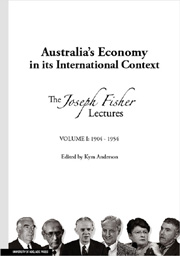Book contents
- Frontmatter
- Contents
- Preface
- List of lectures in volume 2 (1956-2009)
- Contributors to opening chapters
- The benefactor Joseph Fisher
- The lectures
- The lecturers
- 1 1904 – Commercial education
- 2 1906 – Commercial character
- 3 1908 – The influence of commerce on civilization
- 4 1910 – Banking as a factor in the development of trade and commerce
- 5 1912 – Australian company law, and some sidelights on modern commerce
- 6 1914 – Problems of transportation, and their relation to Australian trade and commerce
- 7 1917 – War finance: Loans, paper money and taxation
- 8 1919 – The humanizing of commerce and industry
- 9 1921 – Currency and prices in Australia
- 10 1923 – Money, credit and exchange
- 11 1925 – The Guilds
- 12 1927 – The financial and economic position of Australia
- 13 1929 – Public finance in relation to commerce
- 14 1930 – Current problems in international finance
- 15 1932 – Australia's share in international recovery
- 16 1934 – Gold standard or goods standard
- 17 1936 – Some economic effects of the Australian tariff
- 18 1938 – Australian economic progress against a world background
- 19 1940 – Economic coordination
- 20 1942 – The Australian economy during War
- 21 1942 – Problems of a high employment economy
- 22 1946 – Necessary principles for satisfactory agricultural development in Australia
- 23 1948 – The importance of the iron and steel industry
- 24 1950 – The economic consequences of scientific research
- 25 1952 – Australian agricultural policy
- 26 1954 – The economics of Federal-State finance
1 - 1904 – Commercial education
Published online by Cambridge University Press: 05 June 2012
- Frontmatter
- Contents
- Preface
- List of lectures in volume 2 (1956-2009)
- Contributors to opening chapters
- The benefactor Joseph Fisher
- The lectures
- The lecturers
- 1 1904 – Commercial education
- 2 1906 – Commercial character
- 3 1908 – The influence of commerce on civilization
- 4 1910 – Banking as a factor in the development of trade and commerce
- 5 1912 – Australian company law, and some sidelights on modern commerce
- 6 1914 – Problems of transportation, and their relation to Australian trade and commerce
- 7 1917 – War finance: Loans, paper money and taxation
- 8 1919 – The humanizing of commerce and industry
- 9 1921 – Currency and prices in Australia
- 10 1923 – Money, credit and exchange
- 11 1925 – The Guilds
- 12 1927 – The financial and economic position of Australia
- 13 1929 – Public finance in relation to commerce
- 14 1930 – Current problems in international finance
- 15 1932 – Australia's share in international recovery
- 16 1934 – Gold standard or goods standard
- 17 1936 – Some economic effects of the Australian tariff
- 18 1938 – Australian economic progress against a world background
- 19 1940 – Economic coordination
- 20 1942 – The Australian economy during War
- 21 1942 – Problems of a high employment economy
- 22 1946 – Necessary principles for satisfactory agricultural development in Australia
- 23 1948 – The importance of the iron and steel industry
- 24 1950 – The economic consequences of scientific research
- 25 1952 – Australian agricultural policy
- 26 1954 – The economics of Federal-State finance
Summary
We live in a land where the somewhat nauseating, but one-time popular couplet:
“Let Law and Learning, Arts and Commerce die,
But give us still our old nobility,”
has no power to charm us. In the first place we have no old nobility, and in the next place, we have more common sense. In this community we have Laws which owe their binding attributes to the fact that they have been made by ourselves for our own guidance, and though we may not always find in them the expression of the highest wisdom, even their shortcomings are more tolerable than the fiat of an amiable despot, or of unsympathetic class rule.
If for our learning we are still to some extent dependent on the “Pierian spring” that gushes so plenteously from the seats of British culture, it is beyond controversy that the influence of our own Universities has already stirred in the rising generation a keen appreciation of the glamour of academic life and promises a plentiful crop of erudition in the near future.
Art knows no country, and cannot be cabinned, cribbed, confined by local conditions. While her Australian disciple toils resolutely through the constant labour that alone ensures success, seeking the inspiration that shall immortalie his brush, a fine selection of the world's masterpieces is brought to his aid in this far away corner of the earth, largely by the munificence of those who having done well by the country, have righteously determined that the country shall profit by them.
- Type
- Chapter
- Information
- Australia's Economy in its International ContextThe Joseph Fisher Lectures, pp. 1 - 26Publisher: The University of Adelaide PressPrint publication year: 2009

